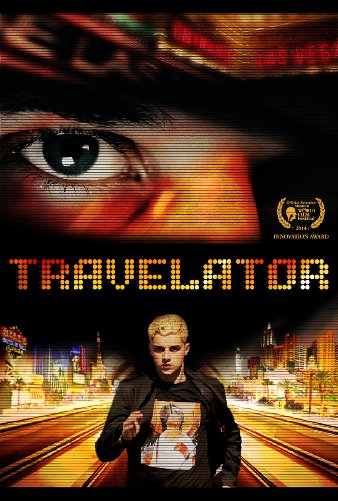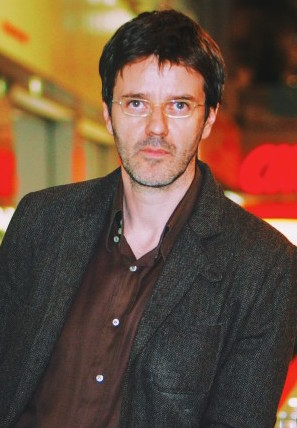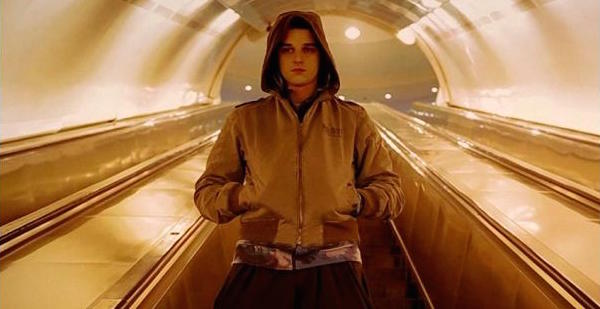European shooting star Nikola Rakocević shines in Travelator
 A teenage refugee hired by Serbia gangsters to carry out a hit in Las Vegas could be a story like so many other Balkan films.
A teenage refugee hired by Serbia gangsters to carry out a hit in Las Vegas could be a story like so many other Balkan films.
But seen through the eyes of innovative director Dušan Milić and fronted by über-talented actor Nikola Rakocević, it conjures an award-winning film that has deservedly attracted international critical praise.
Travelator won the coveted Innovation Award at the Montreal World Film Festival.
Celebrated Serbian actor Nikola Rakocević was recognised as a Shooting Star at the 2014 Berlin Film Festival, placing him among the top ten most promising actors in Europe and marking him out for a bright future in film.
Travelator proves the judges at that prestigious festival were spot on in their assessment of the 31-year-old Serb actor.
Nikola Rakocević shines from Skinning and Circles to Travelator
Nikola came to prominence with the striking Skinning/Šišanje (2010), from director Stevan Filipović. More recently, he garnered well-deserved praise for his role in the acclaimed Circles/Krugovi (2013).
“Nikola is a perfect actor, a perfect young man,’ said Dušan on casting Nikola as lead in Travelator . “To work with him was a pure pleasure. He is extremely talented and full of emotions.”
In Travelator, Nikola plays Slav, that 18-year-old Slovenian refugee who finds himself buried by the fallout of war in Yugoslavia, existing rather than living on a camp outside Belgrade.
As Nikola’s and his worn-out mother struggle to survive being dragged under by the miseries of the camp, the bleached blonde gamer escapes into the world of computer gaming, and he turns out to be a bit of a star player.
An impressive in-game shooting record, marks him out as an ideal stooge for Serbian mobsters, who hire him as a hitman to take out a criminal snitch under witness protection in Las Vegas. As a Slovenian war refugee, Slav does not need a visa to enter the US, which only increases his value to the criminal gang.
Serbia’s criminal elite on the run
Arriving stateside, Slav observes his target from the shadows like a lone wolf. In doing so, he is exposed to the egotism and corruption of this criminal elite, and realises that the Serb warlord-turned criminal kingpin is on the state payroll in return for the heads of criminal and political opponents.
So far, so very Balkan. But this is when Belgrade-born director, scriptwriter and producer Dušan Milić stamps his mark on the film shot in Belgrade and Las Vegas.
 “Travelator is a story about the process of a young man dying,’ he said. “Slav has been chased by the war his whole life. He hasn’t seen anything bright. He is confused by the struggles in life, things he cannot comprehend and solve, and confused by how reality interferes with fiction in his mind. He is lost trying to separate what is what.”
“Travelator is a story about the process of a young man dying,’ he said. “Slav has been chased by the war his whole life. He hasn’t seen anything bright. He is confused by the struggles in life, things he cannot comprehend and solve, and confused by how reality interferes with fiction in his mind. He is lost trying to separate what is what.”
Traveling from his drab and depressing home on a Belgrade refugee camp to the neon glitz of Las Vegas, Slav is increasingly dazed by the new world into which he has arrived and his mindset shifts to its default comfort zone: gaming.
It’s all a game for Serbian-sponsored hitman
Inflamed by the lurid contrast to the social suffering his family still endures, Slav slips into his gameplay persona and gains the confidence that has been stripped from him in the real world. Suitably armed and angered, he is ready to engage with his role as executioner of a man who represents the closest he will get to ripping out the root of all that he has come to despise.
With very little dialogue to distract from the visual feast, an increasingly entranced Slav slides down a mental rabbit hole into a trippy world of POV camera shots, vivid colours and repetitive pumping tunes and hypnotic strings, where stylised gameplay and the shock of reality constantly blur. In this enhanced state, Slav.
Nikola is hypnotic in the almost dialogue-free role, conveying a wild magnetism of his eyes as reality slips away in favour of the frenetic online realm of shoot ‘em up violence. As he dominates the vast majority of camera time, this is no easy task, but one that Nikola takes to admirably with screen intensity.
Gaming is a waste of time, says director
Given the success of the script, it is interesting that Dušan is actually quite dismissive of gaming. “I am not into it at all,’ he said. “I see gaming as a big waste of time.”
Even more commendable, then, that he has so effectively translated the violence to a gaming scenario without being shocking or gratuitous. “I think that I succeeded in portraying the violence in a graphic way, not too real or disgusting,’ said Dušan.
“That is a legacy of video games. Very rarely will you find violence in games that is as gruesome or naturalistic as it is in some modern movies or even the TV news. I wanted it to stay that way, as I didn’t want to shock viewers with the realism of blood and spilt brains.”
Dušan started his career in film as assistant director to Goran Marković on ‘Tito and Me‘. He wrote several screenplays for director Emir Kusturica and Stephan Komandarev (‘The World is Big and Salvation Lurks Around the Corner’).
Emir Kusturica (Underground) produced Dušan’s first two films as director – the well-received comedy Strawberries in the Supermarket/Jagoda u supermarketu (2003) and Guca! (2006), a tribute to the annual wild and raucous Serbian trumpet festival.
Through the lens of Emir Kusturica
Dušan credits Kusturica with his appreciation of the primary force of image in film. “Kusturica implanted in me the belief that in filmmaking the picture is everything,’ he said. “Dialogue is just sound between other sounds. It is no more important than that.
“That is the way I worked on Travelator, believing I was making a silent movie, which is the very essence of filmmaking.”
 A significant visual reference in Travelator, serving as drab contrast to the bright lights and opportunity of Las Vegas, is the refugee camps on the outskirts of Belgrade and the dead-end existence that many see as their life there.
A significant visual reference in Travelator, serving as drab contrast to the bright lights and opportunity of Las Vegas, is the refugee camps on the outskirts of Belgrade and the dead-end existence that many see as their life there.
“Refugees from recent wars in Yugoslavia are still a big problem in Serbia,’ said Dušan. “There are more than 400,000 people still living in refugee camps, dislocated from their homes after all the wars we have had.
“In the camp where we shot the film, there are men, women and children who once lived in Croatia.
“That is more than 20 years of living in total desperation, in some ruined barracks on the outskirts of Belgrade, without the basic life necessities that should be allowed for all human beings. The state is not helping. Serbia is poor and can’t give them proper homes.
The inheritance of war awaiting new generations of Serbs
“After them, came people from Bosnia, Kosovo, and so on. My duty was to record that: to leave their legacy for the future, to portray how we lived and what happened, and how many people still live. I wanted to show what such conditions do to our mental health and the inheritance that awaits new generations of Serbs.”
Serbian cinema audiences have not always reacted well to seeing such raw and sensitive topics exposed on screen, but this is not a concern for Dušan. “It’s not the case just in Serbia,’ he said.
“In every country you have themes that are not accepted by a mainstream audience. In general, most people don’t think with their own heads. They accept the attitudes somebody else has elaborated for them. And that will never improve, neither in Serbia nor in other parts of the globe.
“Of course, I feel a great deal of responsibility as a director when making a movie. In the end, every decision is mine, as the author, so all the responsibility is mine, also. But I don’t think that cinema has the power to change things.”
Shooting on the run in Las Vegas
While the camp scenes were shot in Serbia, much of the film was shot on location in America, with Las Vegas symbolising excess and a disconnect from reality.
“Las Vegas is a mythical but urban place, which is familiar in video games,’ said Dušan. “In its way it is not dissimilar to Belgrade: They are both hectic and chaotic, hedonistic, dirty, contrasting. They have the same kind of aggressive energy. Both cities are never boring.”

To add to the otherworldliness of Las Vegas, Elvis Presley, Michael Jackson and Tina Turner lookalikes were employed to recite from the Bible’s Book of Revelations.
“It is in a way a statement of living in a time of reality TV,’ Dušan explained. “I was always mesmerised by the TV evangelists that preach from TV screens in the US.
Elvis, Michael Jackson and the Book of Revelations
“Originally I wrote in the script that I have one of those preachers in the film, coming out of the television set in a hotel room. But once I saw the impersonators of famous people walking down the Strip, I expressly decided to give them the chance to speak words from Revelations. They sound so true against the backdrop of Las Vegas.”
Lyrically that might have been serendipitous but, logistically, filming in America did not go so smoothly. “On the contrary,’ said Dušan. “The shoot in the US was really a pain in the ass. In Las Vegas everything is private property, even pavements in front of the hotels.
“But we only had some of the permissions needed to film there so we were acting like tourists shooting with a small Canon 5D2 camera and stealing shots whenever we could. It was the only possible way to get the job done.”
Watch Travelator trailer: http://www.youtube.com/watch?v=nACfO1sjA9c
Watch Travelator gameplay: http://www.youtube.com/watch?v=0bBfN0B0VMk


No comments yet.
Be first to leave your comment!